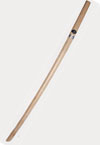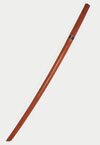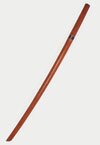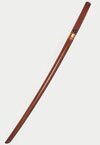|
|
|
 |
|
| Cold Steel Sword Breaker Trainer (92BKSB) |
Points: 2
|
The best of the world's sword fighters have known a simple truth for ages... if you want to become a reasonably good sword fighter you should endeavor to learn sword fighting techniques, footwork and the basic stances. However, if you want to be a master at sword fighting you have to eventually start fighting with a "live blade". If your ultimate goal is to wield a razor sharp sword safely and effectively, you need to train with a sword that approximates the size, feel and heft of a live blade, yet minimizes the possibility of causing grievous, permanent, or life-threatening injury to yourself or your training partner.
Sold Out
|
|
|
|
|
|
 |
|
| Training Longsword PP black |
Points: 2

|
Longsword is made of the polypropylene and closely duplicates a wooden wasters in size, weight and feel but is much stronger. Replacement stright guard(GTTCP504T) is available, it fits both swords: GTTCP504 and GTTCP505.
Sold Out
|
|
|
|
|
|
 |
|
| Hanwei Practical Plus Tanto (SH2259) |
Points: 8

|
The Practical Plus Tanto (SH2259) provides a very economical cutting tanto, but uses more traditional fittings and construction methods. The blade is hand-forged high-carbon steel and differentially tempered using a traditional claying method (HRC 60 edge, HRC 40 spine) with a medium (chu) kissaki. The temper line (hamon) is evident and prominent. The Practical Plus Tanto uses a flat black saya and a black Japanese cotton sageo. The tsuka has genuine ray skin (same) and the tsuka-ito is black synthetic leather for better gripping qualities. The antiqued fittings on this set are decorated in a Japanese dogwood motif with a beautiful antiqued black sunburst tsuba. A great econimcal tanto with fantastic quality.
High Carbon Blade
Authentic Design
Sold Out
|
|
|
|
|
|
 |
|
| Hanwei Raptor Katana, Moroha Zukuri (SH2413) |
Points: 30


|
Forged in the Kissaki Moro Ha Zukuri style, the blade design of the Moroha Zukuri Katana is based on a Tachi blade believed to have been forged around 800 AD by the smith Amakuni, though many similar blades have been produced in later Japanese history.
Sold Out
|
|
|
|
|
|
 |
|
| Hanwei Raptor Katana, Nambokucho Zukuri (SH2416) |
Points: 30

|
The Nanbochuko period in Japanese history (the later part of the 14th. century) encompassed sixty years of internal conflict in Japan, which spawned a demand for more and bigger sword blades than ever produced previously.
Sold Out
|
|
|
|
|
|
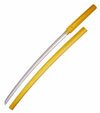 |
|
| Hanwei Shinto Blade in Shirasaya (SH1094) |
Points: 30

|
For those wishing to build a custom Samurai sword on a Hanwei blade, we offer in Shirasaya the blade used in the Shinto Katana, which has met the cutting demands of users worldwide. It is forged and differentially tempered in the traditional fashion, with a distinctive hamon, and is pre-fitted with its habaki. The hardwood Shirasaya is solidly made to provide safe storage of the blade.
Hand forged high-carbon steel blade
Differentially tempered
Pre-fitted Habaki
Sold Out
|
|
|
|
|
|
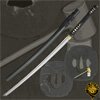 |
|
| Hanwei Tea Culture Katana (SH2331) |
Points: 30


|
In Japan the traditional method of serving tea is a celebrated art form in itself. This highly ritualized ceremony is an involved process, the most elaborate of which can last hours and is reserved for the most distinguished of guests. Our Tea Culture Daisho (SH2331, SH2332) captures the essence of this important tradition. The Katana and Wakizashi are built upon a traditional Shinogi Zukuri style blade with Bo-Hi. The high-carbon blade is hand forged and differentially hardened using the traditional clay method. The Koshirae (furniture) feature the typical elements present in a Japanese tea ceremony. The handle is wrapped with suede leather in a Katati Make (battle wrap) style.
Sold Out
|
|
|
|
|
|
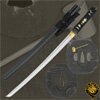 |
|
| Hanwei Tea Culture Wakizashi (SH2332) |
Points: 25


|
In Japan the traditional method of serving tea is a celebrated art form in itself. This highly ritualized ceremony is an involved process, the most elaborate of which can last hours and is reserved for the most distinguished of guests. Our Tea Culture Daisho (SH2331, SH2332) captures the essence of this important tradition. The Katana and Wakizashi are built upon a traditional Shinogi Zukuri style blade with Bo-Hi. The high-carbon blade is hand forged and differentially hardened using the traditional clay method. The Koshirae (furniture) feature the typical elements present in a Japanese tea ceremony. The handle is wrapped with suede leather in a Katati Make (battle wrap) style.
Sold Out
|
|
|
|
|
|
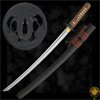 |
|
| Hanwei Three Monkey Wakizashi (SH2330) |
Points: 40

|
The "Three Wise Monkeys" is a popular symbol of the "See no evil, hear no evil, speak no evil" proverb popular in many cultures around the world. The proverb itself is thought to have originated in China and was brought to Japan by a Buddhist monk, while the association with three monkeys appears to be a Japanese play on words. Our Three Monkey Katana (SH2329) and Wakizashi (SH2330) are built on traditional Shinogi Zukuri style blades with Bo-Hi to reduce weight and improve balance. The high-carbon blade is hand forged and differentially hardened. The blackened iron Tsuba features the "Three Wise Monkeys" in relief.
Sold Out
|
|
|
|
|
|
|
|
Tags:
martial arts, katana, iaito, sword, fencing, tonfa, boken, bokken, kama, shinai, samuraj, judo, karate, kenjutsu, kenjitsu, ninja, kungfu,
|

